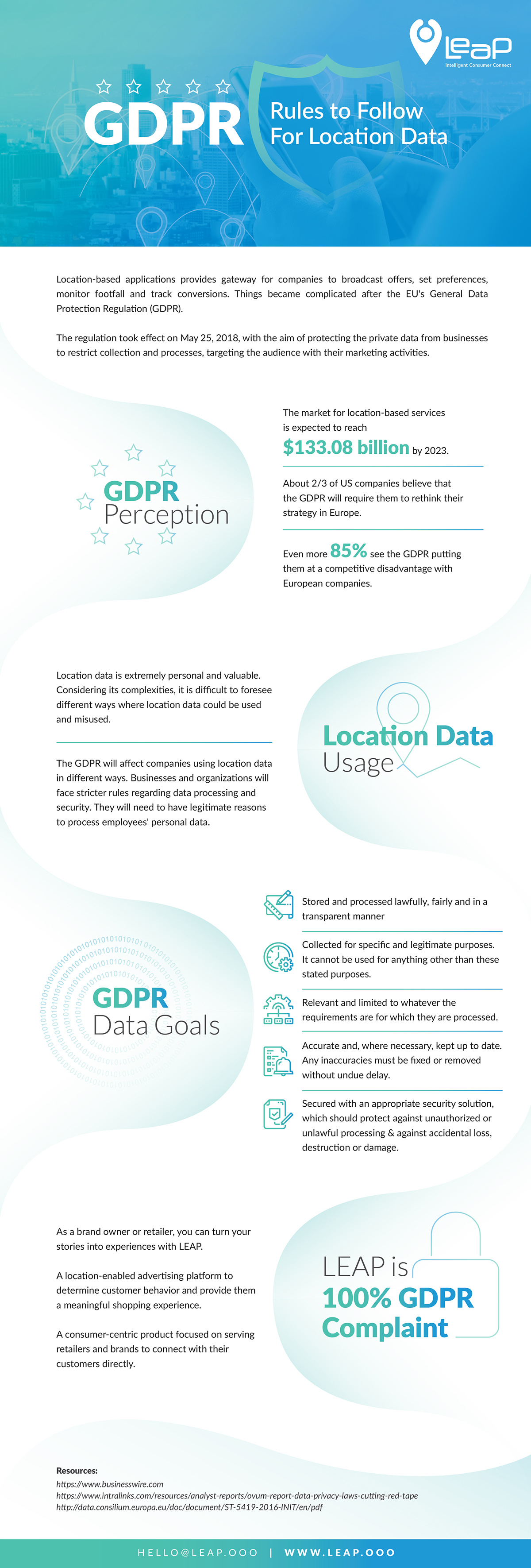


Companies today are exploring the opportunities of location-based services and including it in their targeted marketing strategies. According to Businesswire, the market for location-based services is expected to reach USD 133.08 billion by 2023. Location-based applications have provided a gateway for companies to broadcast offers, set preferences, monitor footfall and track conversions. However, for these companies, things became complicated after the EU’s General Data Protection Regulation (GDPR). The regulation took effect on May 25, 2018, with the aim of protecting the private data from businesses to restrict collection and processes, targeting the audience with their marketing activities.
Insights on the GDPR
GDPR has brought a revolutionary change to the data privacy of Europe citizens. Earlier it had an outdated standard for data protection which was framed and followed since 1995. The regulation requires businesses to protect personal data for any type of targeting messages sent to EU citizens. This regulation also applies to businesses across the world that deal with the European market.
The regulation is implied for all companies and businesses across 28 EU member countries. Therefore, companies will require to maintain this standard which may lead them to make a larger investment. According to an Ovum report, about 2/3 of US companies believe that the GDPR will require them to rethink their strategy in Europe. Even more (85%) see the GDPR putting them at a competitive disadvantage with European companies.
Impact of GDPR on Location Based Services
GDPR changes the way companies collect data and use it to target their customers. The goal is to protect users’ privacy and give them greater control over the usage of their data. As the location data relates to an identifiable personal, these companies should consider GDPR clauses while implementing location-based services.
Right to access: Users have the right to confirm the processed data and get access to its implications.
Right to erasure: Users can set the expiration date on the data that is already collected.
The emphasis on consent. So, companies will require users’ affirmation instead of pre-checked checkboxes while they install or use the apps. Thus, the only change GDPR is implementing is to collect and use the personal data carefully with their consent.
Looking Ahead…
Although, location based services, can benefit companies in a big way, customers feel a threat to their privacy. To overcome this, GDPR compliance can make sure that companies identify and send their product offers to interested candidates only. Though, GDPR will steadily increase the pressure on businesses that process data in the coming times. Following the standards will be a shot in the arm while targeting the exact customers efficiently.
We understand the significance of GDPR to location data and thus we have applied the same in our location enabled advertising platform (LEAP). As a brand owner or retailer, you can turn your stories into experiences with LEAP. This location-enabled advertising platform will let you to understand customer behaviour and provide them a meaningful shopping experience. A consumer-centric product focused on serving retailers and brands to connect with their customers directly.
In addition, LEAP:
Thus, location-based advertising paves the way for both participants – brand/retailers or consumers in the retail ecosystem. To know more about us book a demo now at www.leap.ooo or contact us at hello@leap.ooo.